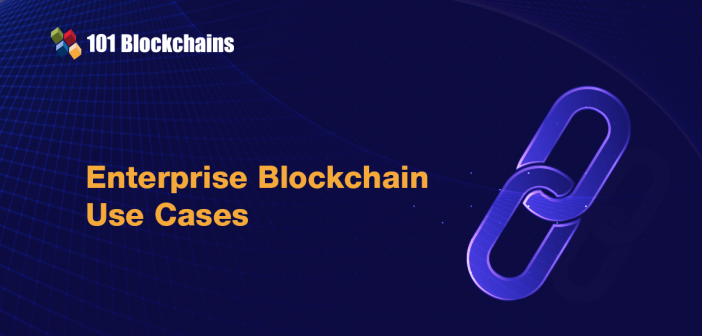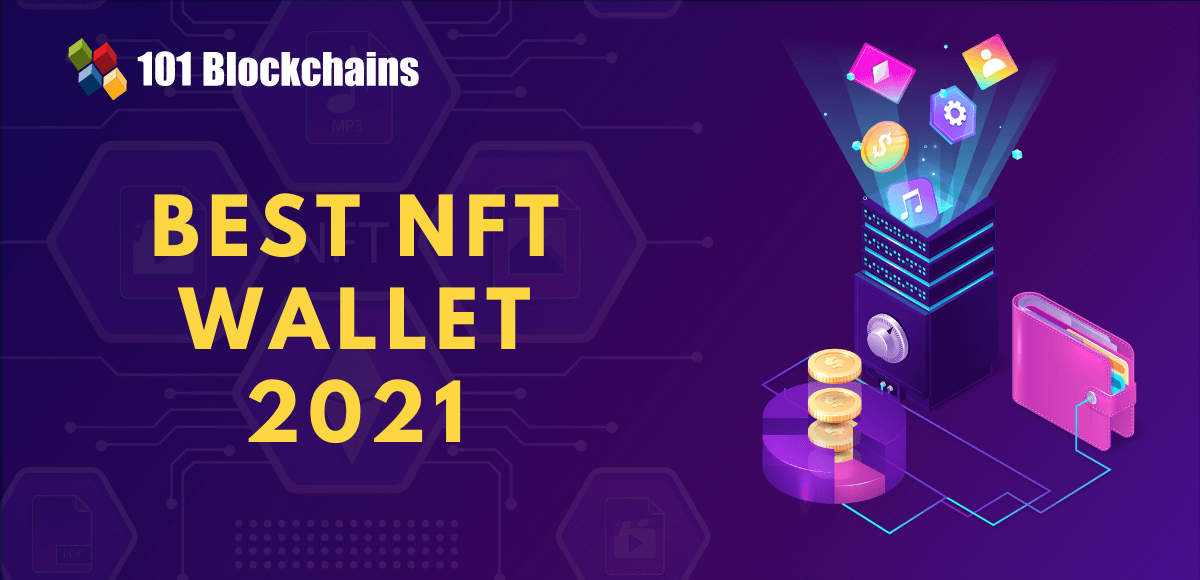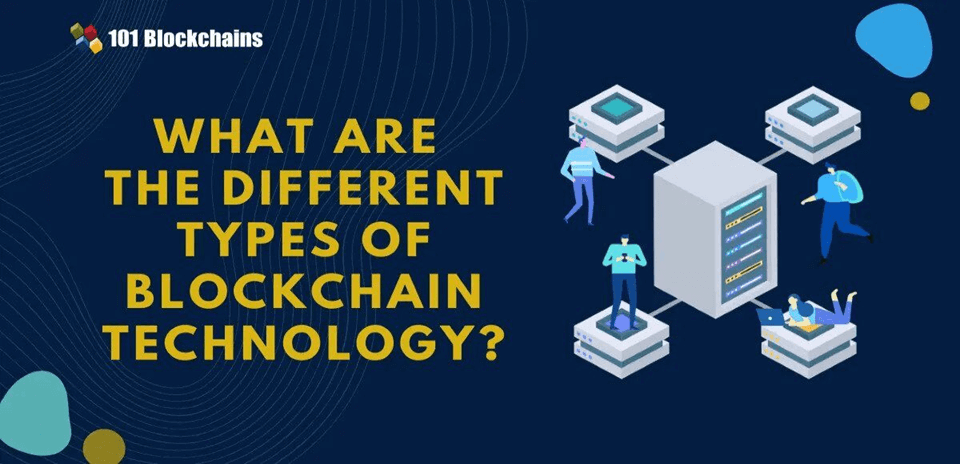Learn how blockchain truly works, master key definitions, and uncover what makes smart contracts so "smart." Dive into the fundamentals, gain valuable insights, and start your blockchain journey today!

- Reviews
101 Blockchains
- on September 02, 2019
10+ Must Know Enterprise Blockchain Use Cases
Are you wondering what the best enterprise blockchain use cases are? If you do, then you have come to the right place.
Today, we will go through enterprise use cases blockchain and learn about them.
Enterprise blockchain has grown big in the last few years with enterprises taking a massive interest in blockchain technology.
So, what makes blockchain so awesome?
Blockchain or in a wide term distributed ledger technology is all about improving efficiency. It lets enterprises to focus on important aspects of their business.
Even Fortune 500 companies are jumping on the ship faster than expected. As stated by experts, there is a definite advantage of adoption blockchain early. These fortune 500 companies don’t want to lose the advantage at all. On top of that, it is beneficial for these big corporations and enterprises actually to adopt blockchain.
There are many benefits to utilizing enterprise blockchain. They include the following.
- Improves trust and communication between internal and external parties
- Reduces the cost of the overall business processes
- Unlock new opportunities with the use of new business models.
- It improves operational efficiency and network accountability.
- Future-proofing business
Build your identity as a certified blockchain expert with 101 Blockchains’ Blockchain Certifications designed to provide enhanced career prospects.
Blockchain in Industry Today
Last two years, 2017-2018 saw a rapid development when it comes to blockchain research and development. We saw multiple proofs-of-concept (PoCs) and many other pilot programs. Research and growth are associated with multiple industries.
With PoCs (an early software implementation), it is clear that everyone wants to become part of the blockchain revolution. After all, blockchain is a new technology with a massive scope of growth. PoCs lets the researcher know about its practicality and feasibility in the real world.
So, why are we speaking about them?
Because they constitute a big part of the enterprise R&D spectrum, and, when you take smaller players into account, things look very different than perceived.
Right now, there are more than 300 companies that are doing their own research according to Outlier Ventures. They track the companies that are working on blockchain technology. Almost half of them are conducting their PoCs, few of them doing patents and others working on full-fledged solutions.
But, in reality, situations are different when it comes to startups. According to them, 99% of the blockchain startups are not genuine. They are working on things that do not constitute anything substantial.
There are many enterprise blockchain use cases which we will list in the later section of the article.
Why 2019 may become the year of enterprise blockchain?
Each year, there are drastic changes when it comes to blockchain. According to State of Blockchains Q2 2019 report by Outlier Ventures, Enterprise blockchains are moving towards open-source.
In 2019, we saw big players open their code to the world. JP Morgan and EY, both agreed to release their open code.
Facebook also released its Libra digital platform idea to the world. If Libra successfully releases, it will make Facebook a financial service marketplace from a simple social media platform.
With government involvement, it will become easy for enterprise blockchain to flourish and grow in 2019 and beyond.
Other reasons why 2019 is the year of enterprise blockchain include the following.
- Top vendors, including IBM, Oracle, and Amazon are now ready with their software.
- Increased interoperability
- Better sentiment around blockchain as a technology
Want to learn more about the Blockchain Proof of Concept? Read This: Blockchain Proof of Concept: Enterprise POC Guide.
What is Enterprise Blockchain?
Before we further move to the enterprise blockchain use cases, we need to understand enterprise blockchain.
A blockchain is a peer-to-peer solution that relies on decentralization building trust, transparency, and immutability.
You can think of blockchain as a list of blocks that are connected through each other. It does it with the help of linked lists and pointers. Both of these terms are technical. If you have never programmed or never did any computer science class, you surely do not know what they mean.
If you are interested, then you can check out the concepts below:
So, what makes a blockchain enterprise?
An enterprise blockchain offers key features that make it possible for it to run on an enterprise scale. Enterprises have a completely different requirement. They need a blockchain solution that not only provides the blockchain features but also do it efficiently.
To get a good idea, let’s go through the key enterprise blockchain features below
Planning to pursue a career in Enterprise Blockchain, but not sure how? Enroll Now: How to Build Your Career in Enterprise Blockchains
Required Features of Enterprise Blockchains
With enterprise blockchain, big companies aim to solve a plethora of different problems. They want to do it with the help of features that blockchain offers.
These features are essential to ensure that enterprise work efficiently. So, what features are those? Let’s explore below.
-
Decentralization
Decentralization is a must-have blockchain feature. It is obvious, but the nature of decentralization should be customizable.
Centralized servers are a thing of the past. They offer good functioning but are limited in certain aspects. For example, centralized servers are more prone to get hacked by external sources. The administrator can also go rogue and bring the whole system down.
A peer-to-peer enabled database where each peer plays a crucial role to maintain the integrity and immutability of data is what enterprise needs.
-
Immutability
Another significant feature that enterprise blockchain can benefit from is immutability.
So, what does immutability means?
Immutability in blockchain signifies that once the data is written cannot be changed at any cost. It is the process of ensuring that the data or the information stored is protected against any form of malicious changes.
It has its benefits, and enterprises can use it to their advantage. In an enterprise setting, the biggest valuable asset is data. Any enterprise generates tons of data every day. By using that data, they can find out more about their business and improve it. If they keep data immutable, then they can be sure that no one, internal or external, is manipulating them.
Many business processes also require the use of data that is managed by multiple people. To ensure that no fraud can happen within the system.
-
Transparency
Transparency can also have a significant impact on enterprises.
Blockchain does offer transparency from the onset. However, it is easy to mix it with privacy. Not everything in a blockchain is transparent.
By transparency, it means that only the aspects of transactions will be public that does not affect the privacy of a person or an organization.
With enterprise blockchain, companies can decide which data they want to make transparent to all the users.
-
Cheaper
Blockchain technology is going to make the whole process cheaper. Apart from the initial setup cost, blockchain reduces the cost of the business process by making them more efficient.
First of all, it brings down the cost by removing unnecessary players. KYC compliance, for example, is one of the costliest processes of any bank. It can make them more than up to 300 million pounds per year. That’s a lot! To streamline the process, banks employ thousands of people working year after year to accept new KYC applications but also maintain and manage the old ones.
One of the biggest reasons why the KYC process can cost so much is because of regulations that keep changing in a finance world.
Blockchains mitigate all these issues and bring in a self-KYC process where the user can do almost everything themselves. It removes mediators and saves the bank or the organization doing KYC a lot of money. This is just one example of how blockchain makes things cheaper.
-
Faster
Enterprise blockchain must provide faster solutions. It is evident that cryptocurrencies are not scalable compared to other forms of payment methods, especially visa, but here we are speaking about enterprise ecosystems where the number of nodes is limited — improving scalability and the time required to do a transaction.
In short, an ideal enterprise blockchain should have the following
- High performance with at least 10000-100,000 TPS. It should also be able to handle a complex computational task with excellent efficiency. Other than it should also be able to handle consensus protocols, and asynchronous flows.
- Be highly resilient where it should have no downtime. Even if it does, it should start from the same state when it shut down without any potential loss of data or information.
- Enterprise blockchains should also have proper privacy and security. It should match enterprise-level standards with multiple levels.
Enterprise Blockchain Use Cases
Great! We have gone through the proper understanding of enterprise blockchain; we are now ready to list the enterprise blockchain use cases. These enterprise blockchain use cases will give you a glimpse of the power of blockchain and its application.
Watch This Video To Know About Top 10 Blockchain Use Cases Right Now!
Banking and Finance
The financial industry has seen the most adoption when it comes to enterprise blockchain. There are many enterprise blockchains, including Quorum that provides the finance sector required blockchain solution.
Multiple projects are currently in concept or being tested to work in real-world through pilot implementation. Many big trade finance companies are taking part in the transformation. For example, financial institutes like American Express, Visa, Citibank, JPMorgan, etc. are continuously working towards a better blockchain solution so that professionals and integral working groups can work together.
With blockchain implementation, the banking and finance sector can save immensely. For example, they can save fees when it comes to doing cross-border settlements.
The future of trade finance is very bright. It will impact multiple aspects of trade finance. To get a good understanding, let’s list the things that it will impact.
- Global Payments
- Trade Finance
- Automated Compliance
- Syndicated Loans
- Insurance – P & C Claims Processing
You can check out our Blockchain In Trade Finance to get a better idea.
Want to know more about the role of Blockchain in Finance? Enroll Now: Blockchain in Finance Masterclass
Food Safety
Food Safety is one of the biggest concerns in our society. We eat food that is manufactured in factories. It also goes through a complicated process before reaching us. It is one of the biggest enterprise blockchain use cases.
There are plenty of ways food can be contaminated or changed.
Right now, we have a blockchain that can help keep food safe. With enterprise blockchain, companies dealing with food can use blockchain to help build trust and transparency.
Blockchain can be used to track the entire supply chain. This means that companies can identify the source of the food, who and where it is processed, and who is responsible for transporting the food. Moreover, it can also track every other important detail about the food, including the places where it is stored.
It can change how the food industry works. IBM is the forefront of providing an enterprise-grade platform for food industry players. The players can utilize the platform and ensure that they can bring transparency to the food industry.
IBM’s journey into food safety is not new. They partnered with Walmart and brought the concept by running the trials on Mexican mangoes and Chinese pork. It worked excellently, and now we have a working enterprise-grade blockchain platform for the food industry.
There will be multiple benefits of using blockchain in the food industry. The future will become more connected. Also, in the long term, using blockchain will be cheaper and more beneficial to the food industry players.
Supply Chain
The supply chain is at the core of any business, be it on the global market or small business. Supply chain defines the success of large enterprises as it maximizes their profit and enable them to reach new audiences faster and more reliably.
Blockchain for supply chain management can change it completely. It not only improve every facet of it but also brings benefits for the end-users by bringing transparency, traceability, and efficiency.
In short, blockchain can completely transform the backbone of the global supply chain. Another big benefit of using supply chain is getting rid of paperwork. Right now, paperwork consists of half of the transport cost. It can happen due to wrong labeling, loss of papers, or even the management cost of it. In many ways, things can go wrong as there is no sure shot way of handling the supply chain and its intricate aspects.
All of this can be changed with blockchain as it will introduce three critical aspects, including traceability, transparency, and traceability.
The future looks bright, and it can only help the different industries to work effectively on product recalls and counterfeiting.
Want to learn more about the role of blockchain in supply chain management? Check out this guide: Blockchain For Supply Chain: The Game Changer
Retail
Retail is big! However, most use-case of retail is the supply chain. We already covered supply chain in detail, but retail does have some other things to offer.
Alibaba, for example, is working on their in-house blockchain network, which will help them embrace blockchain according to their requirements. Alibaba is huge, and their enterprise blockchain can set an example for others to follow. Currently, their focus is to improve the supply chain and ensure that they can bring track product authenticity.
Other retail players such as Walmart or De Beers are also focusing on improving their supply chain.
Automobiles
Automobile manufacturers are also keen to take advantage of blockchain. With the rise of autonomous vehicles(AVs), electric cars, and other auto technological developments, it is evident that companies want to use blockchain.
In 2017, two big auto players Renault and Volkswagen Financial Services were running their Proof-of-Concept(PoCs). In their POCs, they were testing telematics tracking.
So, what is it about? With telematics tracking, all the vehicle’s key information will be captured, stored, and transmitted to key members such as buyers, dealers, insurance companies, and so on! The vehicle data that will be captured include the vehicle’s engine usage history, mileage data, maintenance history, and other critical data regarding the vehicle. This will help all the parties involved in the process. But, it will help the user the most as it can help them get their insurance or better understand their vehicles.
It will also remove frauds in the market as anyone can verify the usage of a vehicle before it is sold. It is a common practice to manipulate odometers to sell the vehicles at a higher value.
Government Services
Governments are very keen when it comes to blockchain. After all, it can transform how a government works. By using blockchain, they can make their systems more efficient in doing a plethora of things, including taking care of the citizen’s IDs in one secure place. There are other types of benefits, including decreasing costs and improve labor-intensive processes by finding the optimal way of delivery.
Government with the use of the blockchain can also instill trust by bringing transparency to the systems. In short, the blockchain-powered government can help streamline the process, protect data, and provide trust to the system.
A digital powered government can register individuals, land, business, or other types of resources on a decentralized network. It improves efficiency on many levels.
So, what the future holds for the government that utilizes blockchain? Well, a lot of things. For example, any government can create their GovChain Stack, which covers different essential government functions, including smart regulations, identity management, process management, and financial & budgeting management.
The government can utilize blockchain in multiple ways
- Education and professional qualifications
- Smart cities
- Loans
- Tracking Vaccinations
- Payroll Tax Collection
Healthcare
Healthcare companies are always looking for better ways to handle their process. Right now, healthcare is in shambles. They use centralized databases, which mean an inefficient way of handling the data, the patients, and the doctors. Also, there is no real connection between the different repositories that are stored all across the country or a particular region.
The struggle didn’t stop here as patients also need to take the burden of carrying their documents. There is no universal repository where the doctors can access the whole healthcare documents of the patient. Another big struggle is the inability to ensure drug authenticity. This is causing a massive issue to patients as they are suffering from fake drugs that harm them more.
Enterprise-level blockchain can solve all of the above problems. At first, it removes the centralized aspects of data storage. This gives patients the ability to store or access their medical records from anywhere they want. Supply chains can also be streamlined to use blockchain, which means that counterfeit drug issue can be solved.
The future of healthcare can be changed drastically by blockchain. It can impact patient consent management, data security in clinical trials, drug traceability, and much more!
Dive deep into healthcare for blockchain by going through the exact use-cases and application here
Insurance
The insurance sector is a great enterprise blockchain use case. The insurance sector, like other sectors, are also suffering from diverse problems that come from centralization. The insurance sector is suffering from insurance fraud, which can cost them millions of dollars per year.
The insurance sector is big and spans over other industries as well. The enterprise-level blockchain implementation means multiple benefits including the following
- Health insurance
- Fraud detection and risk prevention
- Reinsurance
- Property and casualty(P&C) insurance
Energy
Sustainable energy is the need of the future. After all, it embeds the catalyst for innovation. The whole environment depends on renewable energy or other forms of energy. With blockchain, the energy sector can become more efficient and ensure that it grows in the future.
Legacy systems lack the necessary ability to make energy efficient. Take oil and gas; for example, they cannot be managed correctly using old methods. But with blockchain, energy companies can track their usage and production.
The future of energy with blockchain looks bright as it can change even an individual connect with the energy grid. It will bring wholesale electricity distribution into the fray. With IoT, it will be possible for anyone to generate energy and share it with others in the network. It can bring electricity bills down to considerable amounts.
Other improvements will be peer-to-peer energy trading, electricity data management, utility providers, and commodity trading.
Read about Corda Blockchain.
Real Estate
Real estate is an ever-growing industry. Right now, it suffers from centralization. A lot of paperwork is what makes real estate a long process. There is also no proper way to verify papers or get to know if someone owns property or not.
There is a clear need for blockchain in real estate. With the ever-increasing valuation of the real estate over year over, it is no doubt that it can use a brand new technology to help cope with the increasing growth. Any enterprise blockchain should have the right set of features for the real estate with the ability to maintain a decentralized database.
The use-cases of blockchain in use-case include proper land titles and deed records, tokenization, real estate funds, and asset management, investors and tenant identity, real-time accounting, and finally leasing and payments.
Among all the use cases, tokenization can be the biggest disruptor. It will enable issuers to ensure that distributions are done according to a certain condition. Moreover, it will reduce cost by improving execution speed, innovation, better administration, and so on.
Deeds, on the other hand, can also be accessed through distributed ledgers as blockchain is immutable. This means that no one can change or hamper information without the proper right access.
International Trade and Commodities
International trade will also see a significant rise in the use of enterprise blockchain. International trade has its problems. It can be changing regulations to shipping or even certifications. This is one of the best enterprise blockchain use cases.
With an enterprise blockchain, the whole process can be streamlined. First of all, it will facilitate a paperless solution. It decreases the cost. Moreover, it also enables seamless data exchange between parties and improves the KYC process.
Sports
Sports can also utilize enterprise blockchain solutions. It all begins with the use of blockchain to improve different sports section.
Also, the impact can depend upon the type of sports, but the fundamental entities, including teams, athletes, fans, and leagues, will surely benefit from it.
The major impact would be on the fan identity. With blockchain, fans can now engage in a more refined way. Blockchain can help any fan to impact their team directly by doing crowdfunding. They can also get access to digital collectibles.
Other major impactful areas of enterprise blockchain include fan interactions rewards, memorabilia authentication, esports improvement, athlete crowdfunding, and teams tokenization.
Interested in more blockchain use-cases? Check out the Real-World Blockchain Use-Cases
Conclusion
This leads us to the end of our enterprise blockchain use cases. We listed the best use-cases for an enterprise which can help you understand the impact of blockchain on the enterprise sector. We started by understanding what enterprise blockchain and the features that are required for a blockchain to be called enterprise blockchain is.
*Disclaimer: The article should not be taken as, and is not intended to provide any investment advice. Claims made in this article do not constitute investment advice and should not be taken as such. 101 Blockchains shall not be responsible for any loss sustained by any person who relies on this article. Do your own research!





